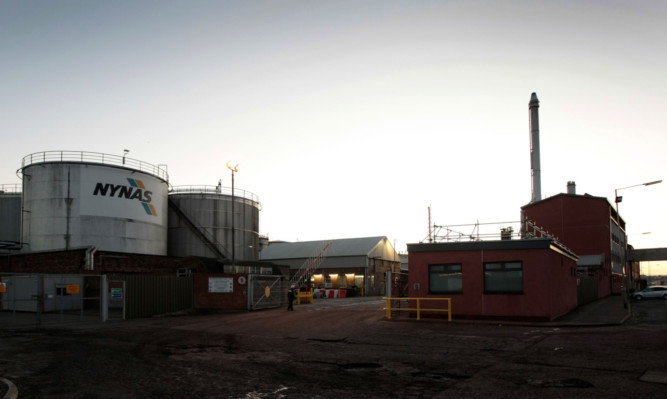A strategic site review could see the removal of the existing refining equipment on Dundee’s waterfront.
The refinery operations at the Nynas plant have been redundant since the company ceased processing crude oil last December.
The Dundee terminal is still used by Nynas, primarily as a distribution point for bitumen arriving by sea.
The company also still operates a number of fuel storage tanks. A reduced manufacturing operation remains, focusing on high-specification bitumen products for the local and UK market.
The site employs 23 Nynas staff plus 10 contract and support personnel, and a local distribution company employs a sizeable number of bitumen and fuel delivery tanker drivers.
The plant, along with other industrial processes on the eastern side of the waterfront, is within view of the environmentally sensitive site of the new V&A Design Museum on which construction is due to start soon.
The environmental sensitivity of Dundee’s Tay shore is an issue that surfaced with the debate into Forth Energy’s ultimately doomed biomass plant.
Critics cited what they saw as a dark brutal appearance, and proximity to the V&A, as a reason for the woodchip-burning incinerator’s rejection.
A need to support industry is a reason to allow industrial buildings and facilities in areas like ports despite aesthetic considerations, but what if the industry no longer exists?
Nynas UK communications manager Brent Wilson said some of the disused facilities at the Dundee plant have been decommissioned and more could be removed.
He continued: “We are using a large area of the site but there are some parts that we no longer use.
“We have already commenced a project that will consider the long-term strategic view of our current operations and future plans for our facility at Dundee.”
What they need will obviously be kept, and they will “have to consider what actions need to be taken with redundant assets. But this will only be done after a thorough review of our activities at Dundee”.
Welcoming the company’s statement, Labour group leader Kevin Keenan said: “Companies have a corporate responsibility to make sure that, when the time comes that they no longer need or use their site or facilities, they clean up afterwards.
“This is to ensure the environment they leave behind is as good as it was before they came.
“Obviously we want to encourage industry, but companies have to ensure that they maintain their operations and don’t allow them to harm the environment, especially if the operations cease,” he added.
